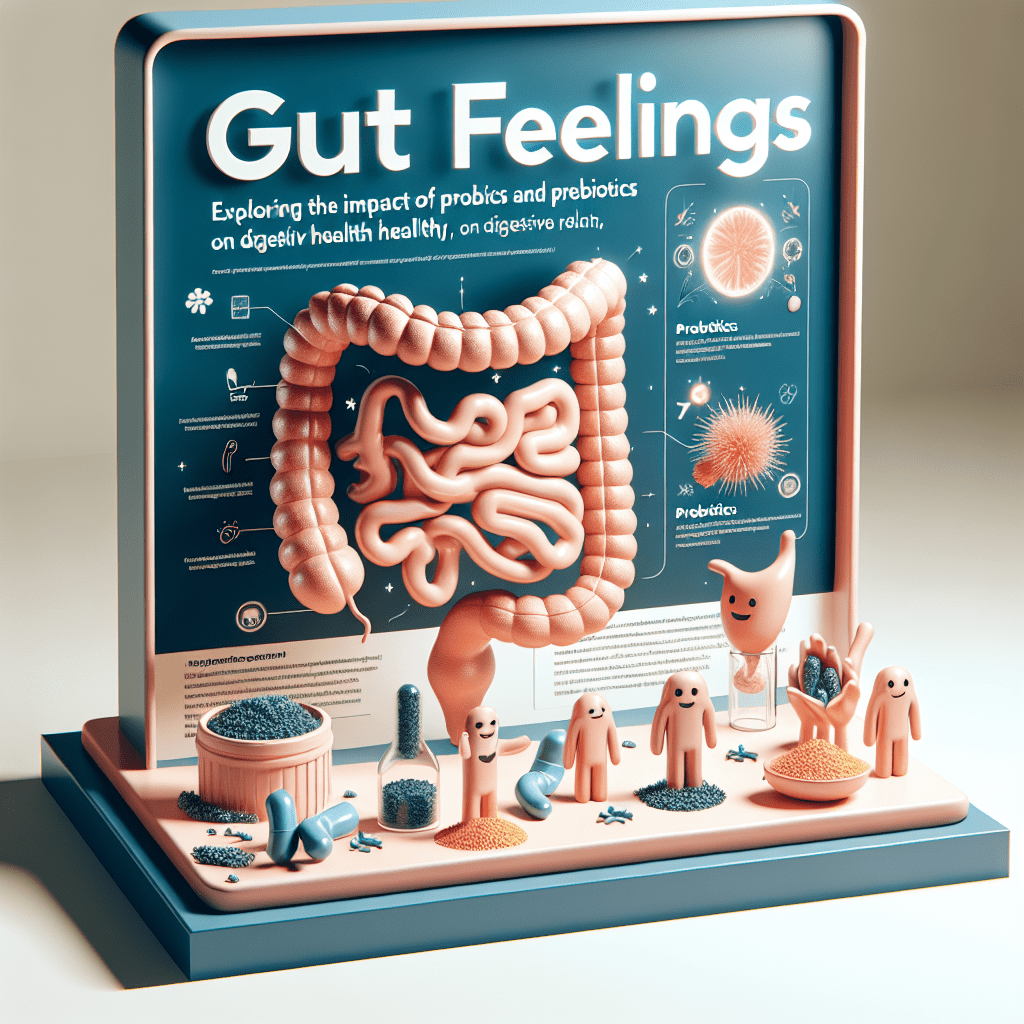[ad_1]
**Gut Feelings: Exploring the Impact of Probiotics and Prebiotics on Digestive Health**
In an era where health consciousness is not just a trend but a lifestyle, the spotlight often shines on the dynamic duo of probiotics and prebiotics. These vital components of our diet are heralded for their remarkable impacts on digestive health, influencing everything from gut feelings to overall wellness. Delving into the intriguing world of gut microbiota, this article unpacks the pivotal roles that probiotics and prebiotics play in nurturing our digestive system, their sources, and the ways they contribute to our health.
**Understanding the Gut Microbiome**
Before we delve into the specifics of probiotics and prebiotics, let’s understand the battlefield they play on – the gut microbiome. This complex community of microorganisms, including bacteria, fungi, and viruses, resides in our digestive systems. Far from being mere passengers, these microorganisms perform critical functions, from breaking down food to producing vitamins and training our immune systems. The balance within this ecosystem is delicate and vital for our health and wellbeing.
**Probiotics: The Gut’s Guardians**
Probiotics are live microorganisms that, when administered in adequate amounts, confer a health benefit on the host. These beneficial bacteria and yeasts are often referred to as “good” or “friendly” bacteria. They can help restore the natural balance of gut bacteria, ensuring a healthier digestive system. Probiotics aid in breaking down food, absorbing nutrients, and fighting off potential infections. They are found in fermented foods like yogurt, kefir, sauerkraut, and supplements.
**Prebiotics: Nourishing the Gut Microbiome**
Prebiotics, on the other hand, are types of dietary fiber that feed the friendly bacteria in the gut. Essentially, they act as food for probiotics. This helps the gut bacteria produce nutrients for your colon cells, leading to a healthier digestive system. Some of these nutrients include short-chain fatty acids like butyrate, which can improve metabolic health and reduce inflammation. Foods rich in prebiotics include garlic, onions, leeks, asparagus, and bananas.
**Symbiotic Relationship**
Probiotics and prebiotics have a symbiotic relationship. Prebiotics provide the necessary nutrients for probiotics to thrive, while probiotics take these nutrients and convert them into other beneficial compounds. This relationship is crucial for maintaining a healthy balance within the gut microbiome, which, in turn, supports overall health.
**Impacts on Digestive Health and Beyond**
The benefits of probiotics and prebiotics extend far beyond merely easing digestive woes. They play a crucial role in preventing and treating conditions such as irritable bowel syndrome (IBS), inflammatory bowel disease (IBD), and even certain types of diarrhea. Moreover, because a significant part of the immune system is housed in the gut, a healthy microbiome can lead to improved immune responses.
Emerging research also suggests links between gut health and mental health, coined the “gut-brain axis.” The gut microbiome can produce neurotransmitters like serotonin, which may influence mood and behavior. Hence, a balanced digestive system might not only make you feel better physically but mentally as well.
**Building a Microbiome-Friendly Diet**
Adopting a diet rich in probiotics and prebiotics is pivotal for nurturing your gut microbiome. Incorporating fermented foods and fiber-rich prebiotic foods can create an environment in which beneficial gut bacteria flourish. Additionally, diversity in the diet is key. Eating a wide range of foods, especially vegetables, fruits, and whole grains, can promote a diverse and resilient microbiome.
**Addressing Common Concerns through FAQs**
**Q: Can probiotics cause digestive side effects?**
A: While probiotics are generally safe, some individuals might experience minor digestive symptoms such as gas and bloating initially. These usually subside as the body adjusts.
**Q: Are probiotic supplements as effective as probiotic foods?**
A: Both have their merits. Supplements can provide specific strains in concentrated doses, which might be beneficial for certain conditions. However, probiotic foods offer additional nutritional benefits. It’s best to combine both approaches for optimal gut health.
**Q: How long does it take for probiotics to work?**
A: It depends on the individual and the condition being treated. Some people might notice improvements in digestion within a few days, whereas others might need a few weeks.
**Q: Can I take prebiotics and probiotics together?**
A: Yes, taking them together can be more beneficial as they work synergistically to improve gut health. This combination is often referred to as “synbiotics.”
**Q: Should everyone take probiotics?**
A: Although probiotics are beneficial, they are not necessary for everyone. Individuals with a healthy diet and no digestive issues may not need them. However, they can be particularly helpful during and after antibiotic use or for those with specific digestive conditions.
**In Conclusion**
Navigating the complex world of gut health can seem daunting, but understanding the roles of probiotics and prebiotics is a good starting point. These gut-friendly agents offer a natural and effective way to support digestive health and, by extension, overall wellbeing. By embracing a diet rich in these elements and recognizing their synergistic relationship, we can unlock the full potential of our gut microbiome, paving the way for not just a healthier gut but a healthier life.
[ad_2]

Leave a Reply